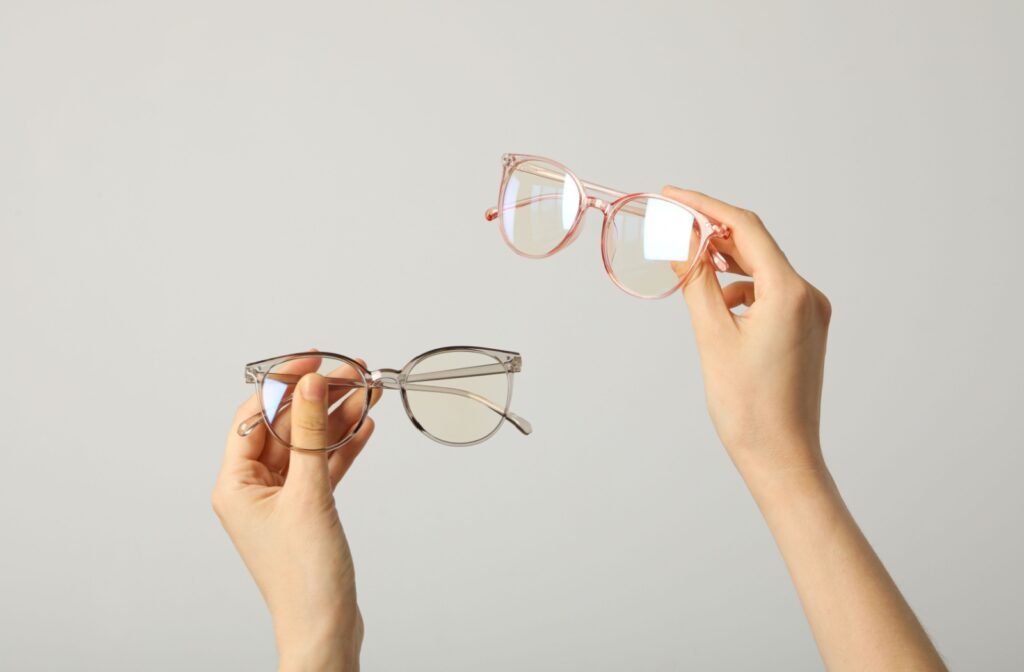Your eyeglasses are a window to the world, but a scratched or peeling anti-reflective (AR) coating can make your view blurry. If you’ve noticed that the coating on your lenses is damaged, you might be looking for a way to remove it.
While there are methods to strip this coating, we do not recommend trying to remove an anti-reflective coating from your glasses at home due to the high risk of permanently damaging your lenses. This approach often creates more problems than it solves. A professional evaluation is the most reliable way to address issues with your eyewear.
What Is an Anti-Reflective Coating?
An anti-reflective coating is a very thin layer applied to eyeglass lenses to reduce reflections from their front and back surfaces. This allows more light to pass through, which can help sharpen your vision, especially at night or when using a computer. It helps others see your eyes more clearly and can reduce digital eye strain from computer use or overhead lighting.
Over time, daily use, improper cleaning, or exposure to extreme heat can cause this coating to break down. When this happens, it can lead to visual distortions. Proper care is key to making your lens coatings last.
Common Signs of a Damaged Coating
Damage to your lenses’ anti-reflective coating can interfere with your vision. It helps to know what to look for so you can address the issue promptly.
Visible Flaws on the Lenses
- A web of fine scratches, often called “crazing”
- Peeling or flaking, usually around the edges of the lens
- A constant hazy or smudged look that won’t go away with cleaning
These issues don’t just affect how your glasses look—they directly impact how well you see. A compromised coating can result in glare. This may make activities like driving at night or reading more difficult.
At-Home Methods & Their Effects
Online sources suggest a few ways to remove AR coating, but these methods carry risks. It’s good to know what these approaches involve and the potential impact they can have on your eyeglasses. If you choose the wrong approach, you may cause irreversible damage to your lenses.
Will Rubbing Alcohol Damage Plastic Eyeglass Lenses?
Rubbing alcohol is sometimes mentioned as a way to dissolve the anti-reflective coating. However, alcohol can be harsh and may damage the plastic of the lens itself, making it brittle or cloudy. This approach carries a high risk of making the problem worse, especially for polycarbonate or high-index lenses.
What About Abrasives or Etching Creams?
Some people try to physically scrub the coating off with a mild abrasive or use a glass etching cream. These methods are aggressive and can easily scratch or permanently fog the lens material. Using etching creams also introduces the risk of chemical splashes, so it’s important to know how to handle potential eye emergencies. Ultimately, this type of lens damage cannot be repaired, and your lenses would need to be replaced.

A Professional Approach with Your Eye Doctor in Long Beach
When you have a problem with your eyeglass lenses, a conversation with a professional is a useful step. An optician or an eye doctor has the tools and experience to assess the damage and recommend a sound solution.
Can You Replace Anti-Glare Coating on Glasses?
Once an anti-reflective coating is removed or damaged, it cannot be reapplied to the same lens. If you want the benefits of an AR coating, the typical solution is to get new lenses. Your local eye doctor can discuss options for new lenses that fit your frames and prescription.
How to Prevent Damage to Your Lens Coatings
Proper eyeglass lens care is key to a long life for your eyeglasses and their coatings. A few simple practices can help you keep your lenses in good condition and your vision clear. Consistent, gentle care is the most effective approach.
Daily Clean & Care
- Rinse your lenses with lukewarm water to remove debris.
- Use a small amount of lotion-free dish soap to gently clean the surface.
- Rinse thoroughly and dry with a clean, soft microfiber cloth.
Proper Storage & Handling
Always store your glasses in a hard-shell case when you’re not wearing them. Avoid placing them lens-down on any surface, as this is a common cause of scratches. These small habits protect your lenses from accidental damage and help maintain the integrity of their coatings.
Damaged lens coatings can be frustrating, but trying to fix them at home often makes things worse. The safest and most effective approach is to seek professional guidance. This ensures you can see clearly and comfortably without risking your eyewear.
If you’re dealing with scratched or peeling lenses, let’s talk. Schedule an appointment with us at Total Vision Long Beach, and let our team help you find the right solution for your vision needs.



